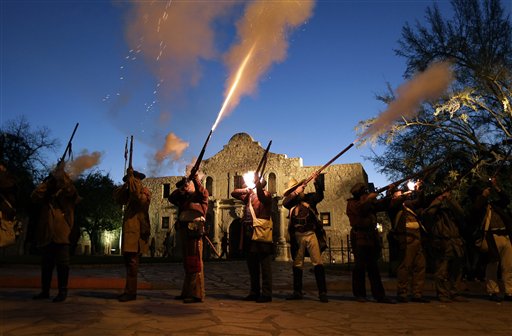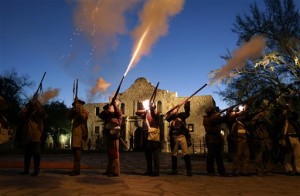

By Roy Bragg
San Antonio Express-News via Associated Press
McQUEENEY — If the day comes when you stand for the Texas National Anthem before a ballgame, you can thank several former Soviet satellite republics, your Texas twang and a bunch of good old boys (and a couple of women) who have been working to rewrite American history for 20 years.
A national anthem means Texas will be its own country, and the folks behind today’s Republic of Texas movement will have convinced someone somewhere that Texas never was part of the United States.
Their plan, surprisingly, doesn’t rely on secession, which is the mistaken belief the Lone Star State has the constitutional right to sever ties with the U.S. government and reclaim its national sovereignty.
“We don’t need to secede,” said Bob Wilson, a Republic of Texas senator. “We never were part of the United States.”
The modern Texians claim the state of Texas exists because of electoral and diplomatic fraud.
Because of that, they consider themselves a government in exile, running the affairs of an occupied territory for about two decades.
Mainstream scholars and politicians believe them to be delusional. Republic officials realize that but remain motivated and idealistic that they’re doing the right thing for the right reasons.
Violence is not on their agenda. They are seeking a peaceful way out of the United States, and as far-fetched as it sounds to run-of-the-mill Texans, they believe they can pull it off by pleading their case before the international community.
This isn’t a giant movement of angry Texans. For starters, they aren’t angry and there aren’t that many of them.
Half of their 14 Senate seats and 26 of their 36 House seats are empty, as is the office of attorney general. Each member of Congress represents wide swaths of the state that don’t conform to modern political boundaries.
The group is predominantly Anglo, middle-aged men, and almost all of them live in the eastern two-thirds of the state. They’ve been meeting at sites all over that area for years.
A meeting this weekend was scheduled at a Waco restaurant. They met at the Veterans of Foreign Wars Hall in Bryan before coming to McQueeney last month.
Most have no political experience. Wilson is a mechanical engineer living in the Metroplex. Secretary of State Billy Ford is a plumber in Iola. The chief justice of the Supreme Court is a construction worker who declines to publicly state where he lives. President Richard Perkins, a head of state by his own definition, doesn’t like being photographed.
A free nation
Their story begins March 2, 1836, when concerned and principled men from across Texas gathered in a barn on the banks of the Brazos River to create a free and independent Texas.
Jump ahead to last month, when a different set of concerned and principled folks, about three dozen from across Texas, gathered in a shuttered beer joint on the banks of the Guadalupe River to continue the cause of a free and independent Texas.
Tables were pushed together on the dance floor of the Silver Eagle Taphouse. A podium was set up on the stage. Neon beer signs flickered in the background. The ad hoc chambers were wired for sound so that the events during that day’s joint session of congress could be recorded for posterity.
Wielding a gavel and a copy of “Roberts Rules of Order,” Vice President Willia Holley presided over a half-day joint meeting of the House and Senate. It included discussion of buying a pre-fab metal building to serve as a capitol, administering the oath of office to a new legislator and a plea from President Perkins to update the Republic’s website, texasrepublic.info.
Everyone was intense, but upbeat. There was very little angry rhetoric or anti-government talk. The group was focused on reclaiming and building their homeland.
“I wish we could stay in the Union, because the U.S. has become the greatest force for charity in history. But we can’t,” Supreme Court Chief Justice Ray Cannon said.
There was discussion about elections and how only Texians, Texans who have made the decision to support their cause, should be considered eligible to vote. A Texian, Cannon added, should consider himself a citizen of the Republic of Texas and not American.
The meeting also included several long speeches from Cannon about the noble mission of resurrecting the Republic, which spills into Oklahoma, New Mexico, Kansas, Colorado and Wyoming.
“We’re not here just to be a group. We’re here for all of Texas,” Cannon said.
The case
This incarnation of the anti-federal movement is unique because it’s peaceful. Previous versions have been assembled as paramilitary patriot groups and focused on secession, hinting at armed insurgency.
Secession long has been the Loch Ness Monster of Texas political lore. Like Nessie, the idea that Texas has some right to secede at will has its believers, but its existence has not been proven.
Denied by courts, ignored by elected officials and refuted by every historical scholar for 167 years, the myth of the state’s right to pack up and bid adios to Uncle Sam nevertheless lives on.
The topic of secession went viral last year. Despondent over President Barack Obama’s re-election, tens of thousands have signed online petitions asking that their respective states be allowed to keep their tax money and go it on their own. Texas, not surprisingly, leads the nation with more than 100,000 signatures.
The White House has politely but firmly refused to act on any of those petitions.
The Republic of Texas folks, however, think they have a winning strategy, based on what they consider dirty politics in the 1845 annexation process back when Texas truly was its own country.
The Republic’s supporters argue that Anson Jones, fourth president of the Republic of Texas, illegally rammed through annexation.
The U.S. offered membership in 1845 and Jones quickly called for a constitutional convention. Modern-day Republic members claim only 13 Texians were among the 57 delegates present.
A 10th Texas congress was elected shortly afterward, and it would have dealt with the issue, but it never took office. Instead, a state legislature convened in 1846 and Texas joined the United States.
Cannon laid out the legal case during the McQueeney meeting to other members.
The precedent for such a strategy being successful comes from another continent. With the Soviet Union collapsing in the late 1980s and early ’90s, the Baltic states of Estonia, Latvia and Lithuania emerged from 51 years of occupation to regain their sovereignty.
Those countries were similar in many ways to Russia, but maintained their own cultures. Texas, as the slogan goes, is a state of mind. It’s got enough of a distinctive culture that it can make a similar claim.
Then there’s this: Earlier this year, in a report titled “Human Rights Violations in Certain Countries in 2012,” the Belarus Ministry of Foreign Affairs accused the U.S. of human rights violations for suppressing Texas’ independence movement.
Cannon held up a photocopy of the article for the McQueeney meeting.
Add all of that up, mix in the Texas Declaration of Independence of 1836, nine years of national sovereignty and the allegations against President Jones, and the Republic thinks it has got a pretty solid case to file at the International Court of Justice at The Hague.
Republic officials aren’t sure how their legal case actually will unfold. It could take months or years, Wilson said, to do the necessary research and prepare the arguments.
Till death do us part
Scholars long have held that history doesn’t support any scenario that attempts to pry Texas from the United States.
Texas indeed was an independent nation for nine years, says Randolph “Mike” Campbell, chief historian for the Texas State Historical Association. But the allegations against Jones are unproven, he says, and the case of an occupied nation is not supported by fact.
“There’s simply nothing to those claims,” Campbell said. “Those are just mythological things.”
The U.S. Congress approved Texas’ annexation. Jones called the constitutional convention — at a time when it took days or weeks to reach remote parts of the state — to grab the deal while it still was on the table, Campbell said.
The new state constitution passed with only one dissenting vote. The only vote against it, Campbell says, was from a guy who had an ex-wife in Philadelphia. He had moved to Texas, when it was a republic, because he swore he’d never live in the same country as her. Hence his “no” vote on the constitution.
Texas voters went to the polls to cast ballots on the referendum on Oct. 13, 1845. It passed 4,254 to 267.
Then there’s the ultimate do-over: the 1869 Supreme Court decision in White vs. Texas.
In that case, which was about Texas’ status and how that affected repayment of overdue bonds, the U.S. Supreme Court ruled that everything that happened before then was pointless.
Chief Justice Salmon P. Chase, writing for the majority, said the state had entered into an “indissoluble relation” with the U.S.
“The union between Texas and the other States was as complete, as perpetual, and as indissoluble as the union between the original States,” he wrote. “There was no place for reconsideration or revocation, except through revolution or through consent of the States.”
And for most people, that was that.
That won’t deter the Republic of Texas from marching on. They realize it’s an uphill struggle, Wilson says, but that it’s worth the effort.
“The heat’s about to get turned up,” Cannon told the crowd ominously. “Are you ready? And it’s going to get white hot.”




